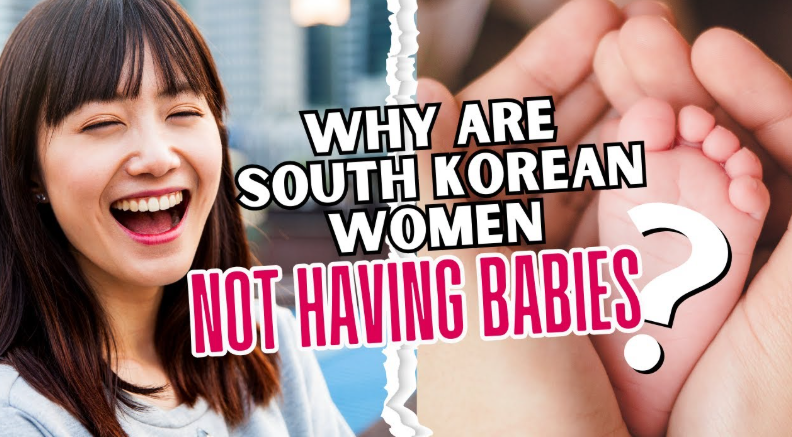Better a dog than a child – that’s the decision many young couples in South Korea make. Some women are even more radical. Their rules: no children, no marriage, no dating, and no sex.
Hongdae is a hip neighborhood near the university with cafes, fashion stores, and street music. Filming children here isn’t easy. South Korea has the lowest birth rate in the world. And this is also noticeable in the streets of Seoul. Suddenly, a stroller appears: But it’s not a baby, but rather a dog.
More strollers for dogs than for children
In Korea, more strollers are now sold for dogs than for children. The reasons for this can be found at a dog café with large exercise areas for the four-legged friends, an hour south of Seoul. Many couples there confirm that they chose a dog over a child. The most frequently cited reason: money. Kim Hyun-jung agrees: There are no children in her circle of friends, but every couple has at least one dog.
“It’s difficult to buy a house in Korea, it’s difficult to earn money, and children are really rare,” says a woman in her thirties.
Something like ‘I got married and now I have a child’ is something you rarely hear; it’s seen as a masterpiece. Korea is a really tough place to raise children these days.“
Young South Korean woman
High pressure in the education system
The big advantage her dog Pudding has: He doesn’t need an education. The lives of children in South Korea are dominated for years by preparing for the tough college entrance exam.Grades determine who gets into an elite university in Seoul, and who, with a diploma from there, will have the best job prospects. Therefore, almost all students go to private tutoring institutes. Many families go into debt to pay for this.
4B Movement: No children, no marriage, no dating, no sex
Raising children in Korea is considered extremely expensive, with little support, a lot of pressure, and care work that still falls primarily to mothers. This is why some women are even more radical: “No children, no marriage, no dating, and no sex.”These are Han Ji-young’s four don’ts, four “bi”s in Korean, meaning “no.” They gave the 4B movement its name.
What is the 4B movement?
Bihon (no to heterosexual marriage), Bichulsan (no to having children), Biyeonae (no to dating men), and Bisekseu (no to sex with men). These are the four no’s, the four “bi”s in Korean, that give the 4B movement its name. Early identifying signs were women who shaved their heads and forwent makeup to resist Korea’s ideal of beauty. The country is known for its cosmetic products and plastic surgery. Supporters of the movement criticize the
K-pop industry for contributing to the objectification of women and young girls.
The dance therapist explains that the movement emerged as a form of resistance for women to protect themselves. Before we can talk about women’s rights, the violence must first be stopped, says the 47-year-old.She works with women who have been sexually abused – often by their own father or boyfriend. Cases of violence against women in Korea repeatedly make headlines: hidden cameras in restrooms, hostility online and offline.
That’s why women decide: I no longer want to share my physical and mental resources with men and thereby expose myself to their violence.“
Han Ji-young, dance therapist and founder of the 4B movement
Deepfake porn scandal
South Korea not only has the lowest birth rate in the world, but also the largest income gap among OECD countries between men and women doing the same job. Han and her fellow activists in the 4B movement criticize the fact that the entire burden of raising children falls on mothers and that it is almost impossible to keep a job after giving birth.
Korea plans to create a new ministry to focus on demographic issues. The women of the 4B movement would prefer to see the state actively punish violent offenders.Dance therapist Han Ji-young is one of the very few who dares to show her face. For fear of hostility, most women prefer to remain anonymous. A recent scandal in which
women’s heads were superimposed on pornography to target women and girls in schools and universities has demonstrated why this is important.
- Deepfake porn: Targeted violence against women
As long as there is so much injustice, sexism, and violence against women in Korea—and as long as the financial pressure on families does not change—the low birth rate is unlikely to change either.
Miriam Steimer is East Asia correspondent and head of the ZDF studio in Beijing.

is an American author, blogger, and cybersecurity specialist based in Florida. He developed an interest in writing during his school years, which later led him to create content aimed at raising awareness about various forms of online scams, particularly in the world of online dating.
On his platform, Scam Service Report, Hall shares analytical articles and practical advice to help users recognize and avoid traps set by scammers on dating websites. He describes common scam scenarios in detail—such as quick declarations of love, urgent requests for money transfers, refusal to engage in video chats, and attempts to move conversations off the dating platform.



